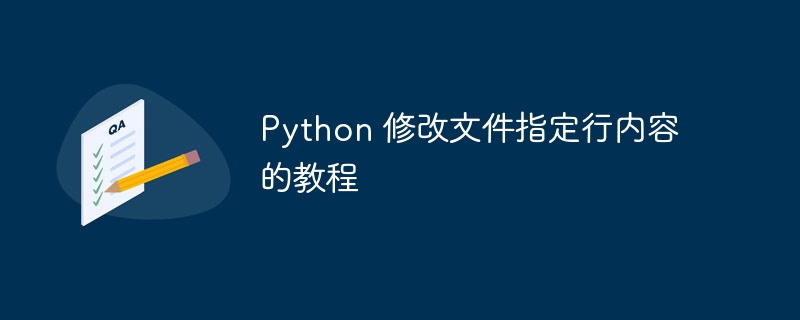Python 修改文件指定行内容的教程
时间:2025-09-06 21:45:27 295浏览 收藏
偷偷努力,悄无声息地变强,然后惊艳所有人!哈哈,小伙伴们又来学习啦~今天我将给大家介绍《Python 修改文件指定行内容的教程》,这篇文章主要会讲到等等知识点,不知道大家对其都有多少了解,下面我们就一起来看一吧!当然,非常希望大家能多多评论,给出合理的建议,我们一起学习,一起进步!

本文介绍了如何使用 Python 修改文本文件中包含特定 ISBN 的行的内容。通过将文件内容转换为易于操作的字典列表,并编写函数来实现读取、修改和写回文件的功能,提供了一个清晰且可复用的解决方案。重点在于避免在读取文件时同时写入,以及正确地更新数据结构。
在处理文本文件时,经常需要修改特定的行。直接在读取文件的同时进行写入操作容易导致问题。更有效的方法是将文件内容读取到内存中的数据结构中,进行修改,然后再将修改后的数据写回文件。本文将介绍如何使用 Python 实现这一过程,并通过一个图书信息管理的例子,演示如何修改包含特定 ISBN 的行的内容。
文件读取与数据转换
首先,我们需要将文本文件中的数据读取出来,并转换成易于操作的数据结构。这里使用字典列表来存储图书信息。每个字典代表一本书,键值对分别对应书的属性和值。
def getBooks(file):
"""
该函数 `getBooks` 读取一个文件,将其内容分割成行,然后将每一行分割成
键值对,创建一个表示图书的字典列表。
:param file: `file` 参数是包含图书信息的文件名或路径
:return: 字典列表,其中每个字典表示一本书,包含其属性的键值对。
"""
# 打开文件
with open(file, 'r') as booksFile:
content = booksFile.read().splitlines()
# 将每一行分割成列表
lines=[line.split(' -- ') for line in content]
# 将每一行中的条目转换为字典的键值对
books=[dict(entry.split(':') for entry in line) for line in lines]
return books这段代码首先打开指定的文件,读取所有行,并使用 splitlines() 方法将其分割成一个列表。然后,对每一行,使用 ' -- ' 分隔符将其分割成多个键值对。最后,使用字典推导式将这些键值对转换成一个字典,并将所有字典存储在一个列表中。
修改指定 ISBN 的图书信息
接下来,我们需要编写一个函数,用于修改包含特定 ISBN 的图书信息。在这个例子中,我们将指定的 ISBN 修改为 '666',但可以根据实际需求进行修改。
def decrementBookUnits(books,isbn):
"""
`decrementBookUnits` 函数接收一个图书列表和一个 ISBN 号码,并将具有给定
ISBN 号码的图书的 ISBN 更新为 '666'。
:param books: 一个表示图书的字典列表。每个字典包含关于
图书的信息,包括其 ISBN。
:param isbn: `isbn` 参数是要减少单位的图书的 ISBN(国际标准书号)。
:return: 更新后的图书列表,在减少了具有给定 ISBN 的图书的单位后。
"""
# 遍历图书列表
for idx, entry in enumerate(books):
# 检查此条目是否具有我们的 ISBN
if entry['ISBN'] == str(isbn):
# 通过直接更新实际的 `books` 对象,更新图书条目的 ISBN
books[idx]['ISBN'] = '666'
# 或者实际减少:
# books[idx]['ISBN'] = str(int(books[idx]['ISBN']) - 1)
return books该函数接收一个图书列表和一个 ISBN 作为参数。它遍历图书列表,查找 ISBN 与指定 ISBN 匹配的图书。一旦找到匹配的图书,就将其 ISBN 修改为 '666'。注意,这里直接修改了 books 对象中的数据,因此修改会反映到原始列表上。
将修改后的数据写回文件
最后,我们需要将修改后的数据写回文件。
def writeBooks(books, file):
"""
`writeBooks` 函数接收一个图书列表和一个文件名作为输入,打开文件,遍历
图书,并将每个图书条目以特定格式写入文件。
:param books: "books" 参数是一个字典列表。每个字典表示一本书,并且
包含该书的不同属性的键值对,例如标题、作者、类型等。
:param file: `file` 参数是图书将被写入的文件名或路径。
"""
# 打开文件,遍历条目,并写回
with open(file, 'w') as booksFile:
for entry in books:
booksFile.writelines(' -- '.join(['='.join([k,v]) for k,v in entry.items()]) + '\n')该函数接收一个图书列表和一个文件名作为参数。它打开指定的文件,并遍历图书列表。对于每一本书,它将其转换成字符串,并写入文件。这里使用了字符串的 join() 方法和列表推导式,将字典转换成指定格式的字符串。
完整示例
下面是完整的示例代码:
def getBooks(file):
"""
The function `getBooks` reads a file, splits its content into lines, and then splits each line into
key-value pairs to create a list of dictionaries representing books.
:param file: The `file` parameter is the name or path of the file that contains the book information
:return: a list of dictionaries, where each dictionary represents a book with key-value pairs for
its attributes.
"""
#open the file
with open(file, 'r') as booksFile:
content = booksFile.read().splitlines()
#split each line to a list
lines=[line.split(' -- ') for line in content]
#turn entries in each line into a key:val pair for a dictionary
books=[dict(entry.split(':') for entry in line) for line in lines]
return books
def decrementBookUnits(books,isbn):
"""
The function `decrementBookUnits` takes a list of books and an ISBN number, and updates the ISBN of
the book with the given ISBN number to '666'.
:param books: A list of dictionaries representing books. Each dictionary contains information about
a book, including its ISBN
:param isbn: The `isbn` parameter is the ISBN (International Standard Book Number) of the book that
you want to decrement the units for
:return: the updated list of books after decrementing the units of a book with the given ISBN.
"""
#iterate through the books list
for idx, entry in enumerate(books):
#check if this entry has our isbn
if entry['ISBN'] == str(isbn):
#update the books entry's ISBN by updating the
# actual `books` object directly using the idx
books[idx]['ISBN'] = '666'
#or actually decrement:
#books[idx]['ISBN'] = str(int(books[idx]['ISBN']) - 1)
return books
def writeBooks(books, file):
"""
The function `writeBooks` takes a list of books and a file name as input, opens the file, iterates
through the books, and writes each book entry to the file in a specific format.
:param books: The "books" parameter is a list of dictionaries. Each dictionary represents a book and
contains key-value pairs for different attributes of the book, such as title, author, genre, etc
:param file: The `file` parameter is the name or path of the file where the books will be written
"""
#Open file, iterate entries, and write back out
with open(file, 'w') as booksFile:
for entry in books:
booksFile.writelines(' -- '.join(['='.join([k,v]) for k,v in entry.items()]) + '\n')
#get the contents of the book an object
# defined by the function
books=getBooks('books.txt')
#see what this looks like
print(books)
#decrement books with an ISBN of 33
books=decrementBookUnits(books,33)
#write our books object back out to a file
# using a new file so this can be run over
# and over again.
writeBooks(books,'books2.txt')注意事项
- 编码问题: 在读取和写入文件时,需要注意文件的编码方式。如果文件包含非 ASCII 字符,需要指定正确的编码方式,例如 UTF-8。
- 错误处理: 在实际应用中,需要添加错误处理机制,例如检查文件是否存在,以及处理文件读写过程中可能出现的异常。
- 文件备份: 在修改文件之前,最好先备份文件,以防止意外情况发生。
- 效率问题: 对于大型文件,将整个文件读取到内存中可能会导致性能问题。可以考虑使用逐行读取和写入的方式,以减少内存占用。
总结
本文介绍了如何使用 Python 修改文本文件中包含特定 ISBN 的行的内容。通过将文件内容读取到内存中的数据结构中,进行修改,然后再将修改后的数据写回文件,提供了一个清晰且可复用的解决方案。这种方法避免了在读取文件的同时进行写入操作可能导致的问题,并提高了代码的可读性和可维护性。在实际应用中,可以根据具体需求进行修改和扩展。
理论要掌握,实操不能落!以上关于《Python 修改文件指定行内容的教程》的详细介绍,大家都掌握了吧!如果想要继续提升自己的能力,那么就来关注golang学习网公众号吧!
-
501 收藏
-
501 收藏
-
501 收藏
-
501 收藏
-
501 收藏
-
251 收藏
-
402 收藏
-
387 收藏
-
118 收藏
-
181 收藏
-
436 收藏
-
285 收藏
-
497 收藏
-
145 收藏
-
496 收藏
-
250 收藏
-
176 收藏
-

- 前端进阶之JavaScript设计模式
- 设计模式是开发人员在软件开发过程中面临一般问题时的解决方案,代表了最佳的实践。本课程的主打内容包括JS常见设计模式以及具体应用场景,打造一站式知识长龙服务,适合有JS基础的同学学习。
- 立即学习 543次学习
-

- GO语言核心编程课程
- 本课程采用真实案例,全面具体可落地,从理论到实践,一步一步将GO核心编程技术、编程思想、底层实现融会贯通,使学习者贴近时代脉搏,做IT互联网时代的弄潮儿。
- 立即学习 516次学习
-

- 简单聊聊mysql8与网络通信
- 如有问题加微信:Le-studyg;在课程中,我们将首先介绍MySQL8的新特性,包括性能优化、安全增强、新数据类型等,帮助学生快速熟悉MySQL8的最新功能。接着,我们将深入解析MySQL的网络通信机制,包括协议、连接管理、数据传输等,让
- 立即学习 500次学习
-

- JavaScript正则表达式基础与实战
- 在任何一门编程语言中,正则表达式,都是一项重要的知识,它提供了高效的字符串匹配与捕获机制,可以极大的简化程序设计。
- 立即学习 487次学习
-

- 从零制作响应式网站—Grid布局
- 本系列教程将展示从零制作一个假想的网络科技公司官网,分为导航,轮播,关于我们,成功案例,服务流程,团队介绍,数据部分,公司动态,底部信息等内容区块。网站整体采用CSSGrid布局,支持响应式,有流畅过渡和展现动画。
- 立即学习 485次学习
